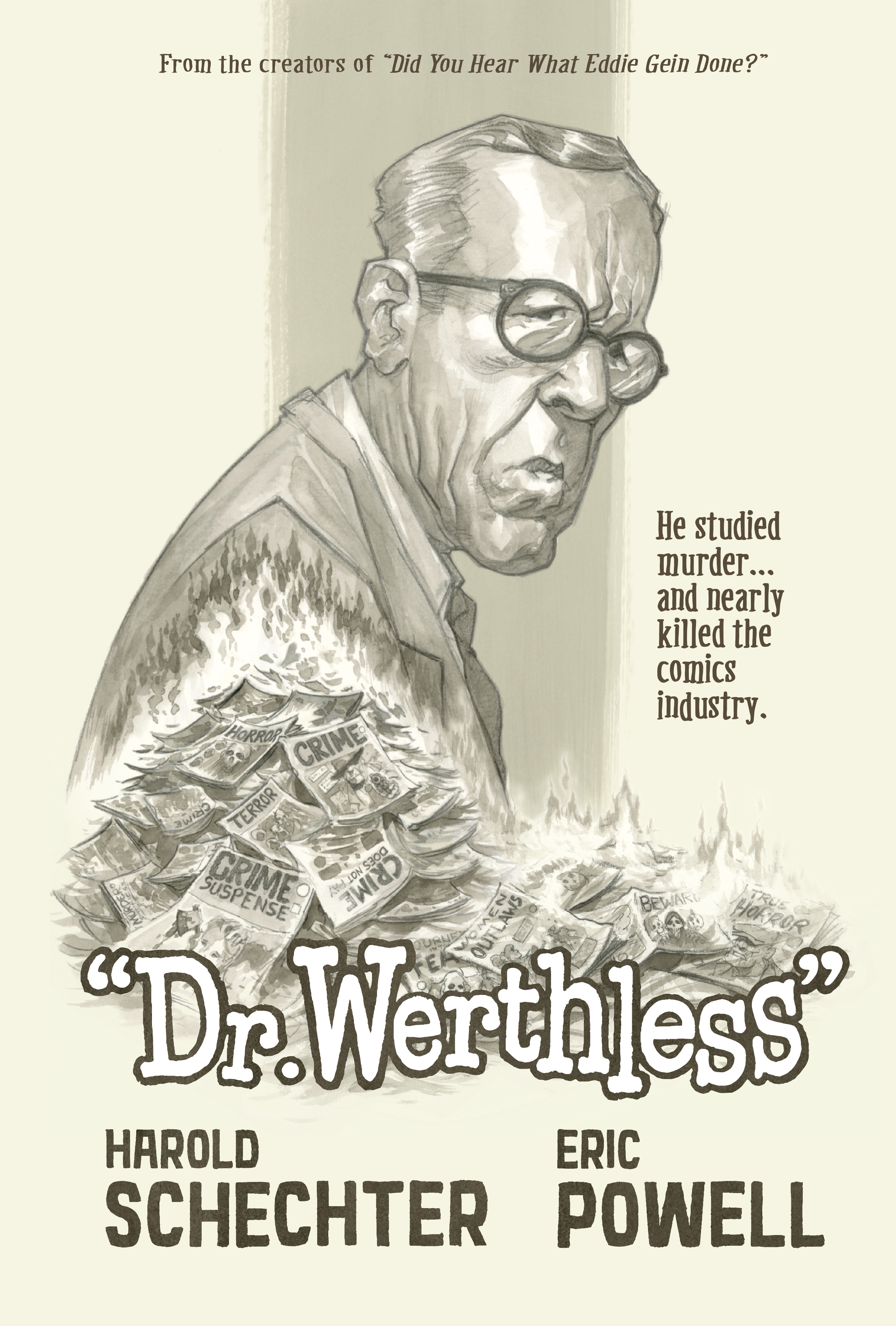 Every month, Dark Horse Comics gives readers a behind-the-scenes look at the making of a comic or book. These articles can include the inspiration behind a specific title, what it's like to work in the comics industry, or some other special feature on the highlighted title of the month! In this month's Horsepower, Harold Schecter shares more about the making of his and Eric Powell's new true crime graphic novel, Dr. Werthless:
Every month, Dark Horse Comics gives readers a behind-the-scenes look at the making of a comic or book. These articles can include the inspiration behind a specific title, what it's like to work in the comics industry, or some other special feature on the highlighted title of the month! In this month's Horsepower, Harold Schecter shares more about the making of his and Eric Powell's new true crime graphic novel, Dr. Werthless:
I first came across Seduction of the Innocent at the home of an opera-loving, museum-going, culturally sophisticated cousin who had undoubtedly purchased it because it confirmed her belief that comics were a particularly pernicious form of mind-corrupting trash. As a kid growing up in the 1950s, I was keenly aware of the existence of juvenile delinquents (at least two lived down the hall from me in our Bronx apartment building). Even at that young age, however, I could see no possible connection between their seriously antisocial behavior and reading comic books, especially since I had never known them to read anything. Not only that, but I myself had spent my schoolboy years consuming comics, including the entire E.C. line, without ever having been driven to join a street gang or brandish a switchblade knife. Like so many others of my generation, I saw Wertham as a narrow-minded prig whose strident crusade had killed off some of the greatest comic books ever created.
It wasn’t until many years later, when I was researching my book Deranged about the monstrous Albert Fish, that my opinion began to change. Of all the psycho killers our country has produced, Fish, in the eyes of many (mine included) was the most sheerly malevolent. Brought in to examine him by the old man’s defense attorney, Wertham, without in any way minimizing the appalling nature of Fish’s crimes, viewed him not—as so many others did—as an inhuman fiend, evil incarnate, but as a profoundly sick human being whose life should be spared partly because he was manifestly insane but mostly because Wertham felt that forensic science could profit by studying such a uniquely warped personality. In contrast to the shrill, semihysterical tone of Seduction, Wertham’s trial testimony was a model of scientific objectivity and a deep concern with the root causes of violence. I found the same characteristics on display in his treatment of Robert Irwin, subject of my book The Mad Sculptor. It was while researching that book that I also became aware of Wertham’s deep commitment to civil rights, including his establishment of the Lafargue Clinic, the first psychiatric facility to treat inner-city minorities (at 25 cents a session or nothing at all if the patient couldn’t afford a quarter).
For a while, I toyed with the idea of writing a biography of this brilliant much-maligned figure, one that would shatter the stereotype of him as a McCarthy-era witch-hunter. I even put a classified ad in the New York Times Book Review (back when such things were done), asking anyone with information about Wertham’s life to contact me. In the end, however, nothing came of the idea.
Skip to a few years ago. One day, after our happy collaboration on the award-winning graphic novel Did You Hear What Eddie Gein Done?, artist extraordinaire Eric Powell asked me if I had any ideas for a follow-up. When I mentioned my never-realized Wertham project, he instantly expressed interest. One of the highlights of our collaboration was a trip to Washington, D.C. where among Wertham’s papers at the Library of Congress we came upon a treasure trove of rare documents that shed invaluable light on Wertham’s life, motivations, and ideas. It’s taken two years to bring the project to completion, largely because of the time necessary for Eric to produce his astonishing artwork. (I often tell people that collaborating with Eric is a joy for me since he does most of the work.)
It's our hope that the finished product presents a fully rounded portrait of this enormously complex, in many ways deeply admirable man, whose pet theories about the societal influences that turn vulnerable children into criminals ended up nearly killing off the comic book industry.
—Harold Schechter
Dr. Werthless, written by Harold Schechter and Eric Powell and illustrated by Powell, will be on sale July 2!
Find Horsepower on the last page of all Dark Horse single issues or here on our Newsfeed.